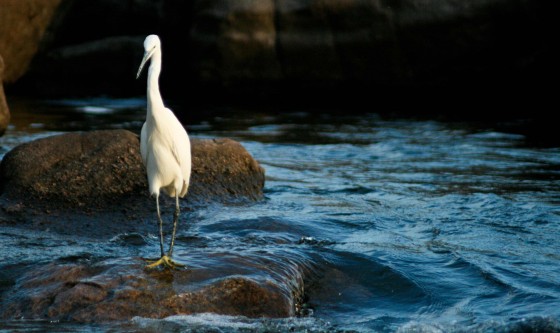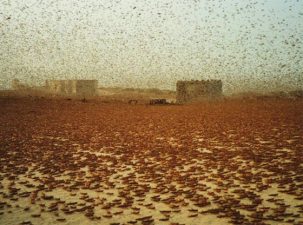 Gentle artists and prophets inspired by nature offer a cure against environmental destruction
Gentle artists and prophets inspired by nature offer a cure against environmental destruction
This post takes its inspiration from two different stories. One by Mike Shanahan, an environmental journalist whose work we admire, and another published in Al MasryAlyoum. The first proposes that incorporating religious principles into our daily lives will heal our relationship with the earth. Our own Arwa has suggested, for example, that Islam promotes eating meat in moderation, and the MTV Muslimah discusses how Islam kindles her eco-soul.
The second profiles an artist who captures the magical colors of a Nubian village before its harmony is destroyed. In both cases the message is clear: we no longer walk in step with nature. Somehow, we have built a global empire that values excess over simplicity, ambition and individuality over the love of our fellows. Can art and spirituality bring us back down to earth?
Spiritual pollution
Although currently taking a break from his position at the International Institute for Environment and Development, Mr. Shanahan is using this month to work with the Convention on Biological Diversity. He also posts brief commentary to his new blog.
Summarizing an interview with Zen Buddhist master Thich Nhat Hahn in The Guardian, Mr. Shanahan writes, “…the root cause of our environmental problems — from overfishing to climate change, from deforestation to the loss of biodiversity — is that societies worldwide have become spiritually polluted.”
Our viral fear of discomfort, and our lack of faith in nature’s ability to provide for us, has led us instead to take comfort in behaviors that nature can’t sustain.
Referring to the Thich Nhat Hahn’s recent book ‘The World We Have – A Buddhist approach to peace and ecology‘, Mr. Shanahan quotes:
“The situation the Earth is in today has been created by unmindful production and unmindful consumption. We consume to forget our worries and our anxieties. Tranquilising ourselves with over-consumption is not the way.”
The solution, according to both the environmental master and the Zen master, is to take comfort in simplicity, to enjoy kindness and benevolence, to love nature. Because when you love a thing, a soft puppy, a particular lake, or another person, the humanity in you seeks to protect that thing.
Gharb Soheil
It is because Hoda Baraka loves Gharb Soheil that she has picked up her camera to protect it. What draws thousands of visitors each year to this village in northern Egypt – the colors, the Nubian men whose simple lives are etched on to their skin, the stark environment – is also in jeopardy of being destroyed.
Tourists are economically valuable, but tourist expectations and fantasies often overrun a place and ruin its character. Elsewhere in Egypt the pyramids are barely visible through Cairo’s smog, and the Red Sea, a haven for divers, is fished out, its coral reefs bleached.
What we lose, we can never regain,” Ms. Baraka told Al MasryAlyoum.
Her images eschew facts, inculcating beauty instead in order to help the villagers campaign against unsustainable development. This aim is supported by the Center for Environment and Development for the Arab region and Europe (CEDARE).
Surrounded by billboards and exciting, flashy toys that can distract us from simplicity, we sometimes need an earthy reminder. At these times, it can be helpful to invoke the colorful, gentle messages gifted by our prophets and by our artists.
:: Mike Shanahan and Al MasryAlyoum; upper images by Tafline Laylin
Lower image by photographer/environmental journalist Hoda Baraka. Picture exhibited in exhibit entitled ‘From Gharb Soheil’
More Travel and Nature stories:





Instead of people turning to the old ways and religions of the past, a new generation is turning the environment into a new religion.